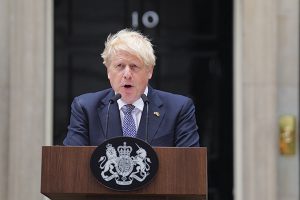Bloomberg
Boris Johnson has resigned as UK prime minister, bringing the curtain down on a tempestuous three years in office marred by a succession of scandals that culminated in the rebellion of his own cabinet and parliamentary group.
Johnson, 58, bowed to the inevitable after the mass resignation of members of his government, including Chancellor of the Exchequer Rishi Sunak, as a mounting number of Conservative MPs launched excoriating public attacks on his judgment, leadership and allegiance to the truth.
“It is clearly now the will of the parliamentary Conservative Party that there should be a new leader of that party and therefore a new prime minister,†Johnson said in a brief statement outside 10 Downing Street, blaming the “herd instinct†in Westminster for his departure.
He said a timetable for the leadership election will be announced next week and that he will serve alongside his cabinet until a new Tory leader is in place. He leaves a nation mired in political and economic uncertainty and still showing the strains of his singular though deeply divisive triumph — the UK’s exit from the European Union — as it confronts surging inflation, potential recession and the threat of widespread industrial action. The Conservatives trail the main opposition Labour Party in the polls, their past reputation for sleaze revived on Johnson’s watch.
Officials said earlier that he wants to stay on as caretaker premier until October. Whether or not his party allows him to remain in office for that long, possible successors are already lining up. They include Foreign Secretary Liz Truss, Trade Minister Penny Mordaunt, Defence Secretary Ben Wallace and the newly installed chancellor, Nadhim Zahawi, as well as Sunak and ex-Health Minister Sajid Javid — who both quit the cabinet on Tuesday. The field is likely to swell.
Johnson’s position became untenable on Wednesday after a day of drama in Westminster that saw him confronted by Tory MPs, told to resign at Prime Ministers Questions in the House of Commons, and a delegation of cabinet ministers head to Downing Street to tell him his time was up. By Thursday, with even his new appointments calling on him to go, Johnson conceded defeat.
It’s a humiliating end to a political career that included his landslide election victory in December 2019 promising to “Get Brexit Done.†That was the high point for a premier who idolized Britain’s wartime leader Winston Churchill, his tenure fatally undermined by the constant drip-feed of scandal that eroded Downing Street’s reputation for probity.
The final straw came with the prime minister’s decision to promote an MP, Chris Pincher, to a senior government role despite knowing of a formal complaint into inappropriate behavior. Johnson then failed to come clean quickly enough on what he knew when Pincher was reported as having erred again last week.
While perhaps not the most lurid revelation in the annals of Westminster scandal, it added to the cumulative sense of a prime minister who flaunted his disregard for the rules. It was compounded by the fact that junior ministers and MPs were fed with erroneous information to repeat before the cameras, making them accessories to the falsehood. That led to the resignations on Tuesday of two of Johnson’s most senior Cabinet members, Sunak and Javid, with the latter saying he had lost confidence in the prime minister. “We cannot go on like this,†Sunak told the premier.
Wednesday witnessed the departure of a slew of other government officials even as Johnson warned plotting rebel Conservatives he would fight any attempt to oust him.
 The Gulf Time Newspaper One of the finest business newspapers in the UAE brought to you by our professional writers and editors.
The Gulf Time Newspaper One of the finest business newspapers in the UAE brought to you by our professional writers and editors.
